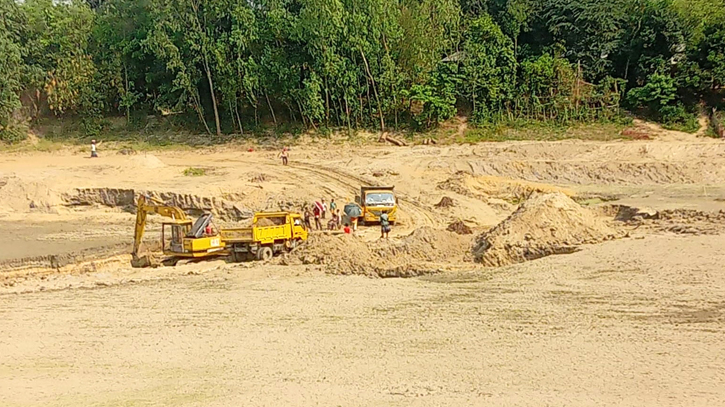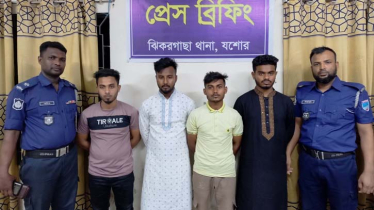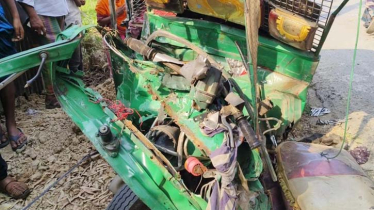
This is how soil is being excavated from the bottom of the Gumani River daily using excavator machines. This photo was taken from Nimaichra area of Chatmohar Upazila in Pabna on Thursday afternoon.. Photo : Messenger
The Gumani River, a vital waterway in the Chatmohar upazila of the district, is facing an unprecedented crisis due to rampant soil extraction. This illegal practice not only poses a severe threat to the river's ecosystem but is also accelerating untimely erosion, potentially leading to catastrophic consequences for the surrounding areas.
Under the auspices of a former Union Parishad (UP) chairman, a mud-cutting festival has emerged along the banks of the Gumani River. Utilizing dredger machines, a gang is engaged in extracting soil day and night. Despite the deliberate environmental degradation and the illegal nature of their activities, the local administration has been conspicuously absent in taking any action to halt this destruction.
The extracted soil is being supplied to brick kilns that have been set up illegally, further worsening the environmental impact. The continuous cutting of soil is threatening the local environment, and the constant movement of soil-laden dump trucks and shallow-engined bulldozers is causing significant damage to the roads in the area.
Upon visiting the area and speaking with local residents, it was revealed that Naib Ali, a member of Ward No. 1 of Nimaichra Union Parishad, and Mizanur Rahman, a member of Ward No. 4, are actively involved in cutting soil from the river and selling it to brick kilns in Paschimpara, Dhankunia Mandalbari, and Mirzapur areas. Locals allege that they are participating in this soil-cutting festival under the protection of Kamruzzaman Khokon, the former chairman of Nimaichra Union Parishad and the president of Nimaichra Union Awami League.
When questioned about their involvement, Naib Ali Gumani, a member of Ward No. 1, admitted to cutting the river's soil. He claimed that they were filling potholes for the benefit of the village's residents. He also admitted that Kamruzzaman Khokon was involved in their soil-cutting business.
Kamruzzaman Khokon, the former chairman of Nimaichra Union Parishad and the president of Nimaichra Union Awami League, acknowledged the soil cutting but downplayed his role, stating that he was merely providing assistance to some younger villagers involved in the practice.
In response to these allegations, an organization named 'Chalanbeel Raksha Andolan' has taken steps to address the issue. The organization has submitted written complaints to the Chatmohar Upazila Executive Officer and other relevant authorities, urging them to stop the illegal cutting of soil from the Gumani river and to protect the environment. Despite previous complaints, the situation has worsened, with no apparent action taken by the authorities.
The Member Secretary of Chalanbil Raksha Andolan Committee, Bapa Central Joint General Secretary SM Mizanur Rahman, expressed frustration with the lack of response from the authorities and the continuation of the soil-cutting festival. He has reiterated his commitment to seeking a resolution to this issue.
In response to these concerns, Chatmohar Upazila Nirbahi Officer (UNO) Md. Reduanul Halim has assured that action is being taken against those involved in illegal soil mining from the river. He emphasized that no exemptions will be granted to those engaging in these activities.
The situation along the Gumani River highlights the urgent need for effective enforcement of environmental laws and the importance of protecting our natural resources. The local administration must act swiftly and decisively to stop the illegal soil extraction and to hold those responsible accountable. Failure to do so could lead to irreversible damage to the river ecosystem and the surrounding environment, with long-lasting consequences for the communities that depend on it.
Messenger/Disha








